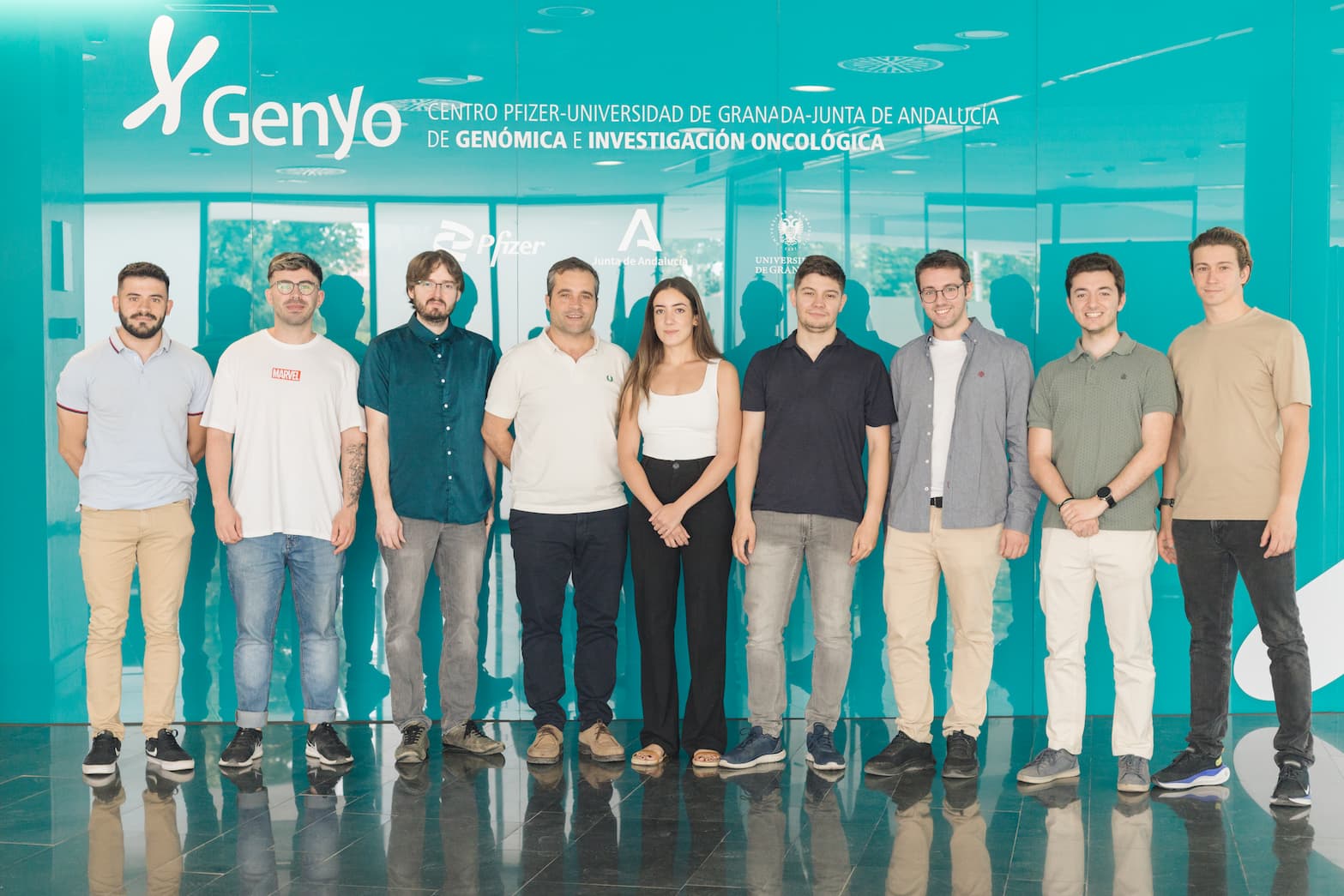There are no projects in the garbage can.
Bioinformatics and Health Data Science
Omics technologies and new experimental techniques allow the simultaneous quantification of thousands of biological variables and generate large volumes of data.
This amount of information necessitates the use of appropriate analysis techniques to handle and extract knowledge from these massive datasets.

Home - Personalised Medicine Area - Strategic Line 3: Detection, Diagnostics, Monitoring and Prognostics of Diseases - Bioinformatics and Health Data Science
Omics technologies and new experimental techniques allow the simultaneous quantification of thousands of biological variables and generate large volumes of data. This amount of information necessitates the use of appropriate analysis techniques to handle and extract knowledge from these massive datasets. Our main research lines focus on developing and applying new computational and statistical methods for the integration and analysis of multi-omics and biomedical data, aiming to achieve a better understanding of the molecular mechanisms associated with complex diseases, as well as advancing their diagnosis and treatment. Specifically, we are interested in developing applications and methodologies in
different contexts:
Methods for integrated analysis of multi-omics data
The growth of omics techniques has led to an explosion in the availability of data in public repositories. With the appropriate methodologies, this data is an invaluable source for generating new knowledge, hypotheses, and predictive models. In our group, we have developed new methods and software based on meta-analysis techniques and data integration, applied to biomarker discovery and functional annotation analysis,among other fields.
Development of computational techniques to establish molecular signatures and prediction models for drug response and patient classification
We are creating algorithms to establish omics signatures that define new classification models and guide in predicting responses to treatments or prognosis of pathologies, also integrating information from electronic medical records. In this context, we have various collaborations with other expert groups in different pathologies such as autoimmune diseases and cancer.
Development of software and bioinformatic analysis tools
One of our objectives is also to develop open-source applications that make our methodologies available to the scientific community. These applications are widely used for analyzing biomedical data. The list of developed software is available at https://compbio.ugr.es/tools/.
Our research has a highly multidisciplinary component, allowing us to establish synergies with other groups that have resulted in patents and joint projects with a clear translational focus. Some of our methodologies have also been implemented in open-source software packages, which are globally used by research groups to extract information from biomedical data and generate new knowledge in diverse areas.
We actively participate in different bioinformatics networks and consortia that enhance the center’s national and international visibility in these areas, such as TransBionet (Translational Bioinformatics Network) in which Dr. Pedro Carmona has been coIP in the “Redes de Excelencia” projects. We promote engagement in collaborative projects with other groups to address complex challenges with a strong inter- and multidisciplinary science component. We are committed to maintaining high criteria of excellence and quality in our publications, aligned with the center, with a percentage > 85% in Q1.
We are part of a working group to apply for an ERC Synergy grant (we have already participated in the last call, and although our proposal has not been granted, we have reinforced the research proposal for future calls). We have consolidated collaborations with different international groups, such as Dr. Julio Sáez (Head of research at EBI_EMBL) or Dr. Giusepe Jurgan (Head of Data Science for Health Unit), with joint projects and mobility of students (predoct and postdoc). We plan to launch proposals for Marie Curie actions and COST.

File number: PP2024PP-07
Principal Investigator: Dr. Pedro Carmona Sáez
Funder: UGR
Execution period: 01/01/2025 – 31/12/2025
File number: PID2020-119032RB-I00
Principal Investigator: Dr. Pedro Carmona Sáez
Funder: Agencia Estatal de investigación
Execution period: 01/09/2021 – 30/06/2025
File number: ProyExcel_00978
Principal Investigator: Dr. Jordi Martorell
Funder: CUII
Execution period: 01/02/2023 – 2026
Network analysis of longitudinal electronic health records using linear mixed models.
Authors: Vargas-Fernández M, Luna JD, Martorell-Marugán J, Carmona-Sáez P
02/2026 - BioData mining
Unraveling SLAN+/- monocytes transcriptomics in lupus and extracellular vesicles effects.
Authors: Losada PX, Villatoro-García JA, Jaramillo J, Serrato L, Álvarez K, Rodriguez D, Diaz JC, Pineda R, Carmona-Saez P, Rojas M, Vásquez G
12/2025 - Immunobiology
Benchmarking single-sample gene set scoring methods for application in precision medicine.
Authors: Toro-Domínguez D, Wang C, Ellson-Lancho I, Martorell-Marugán J, López-Domínguez R, Carmona-Sáez P, Alarcón-Riquelme ME, Baribaud F
11/2025 - Briefings in bioinformatics
Effect Size-Driven Pathway Meta-Analysis for Gene Expression Data.
Authors: Villatoro-Garcia JA, Jurado-Bascon PP, Carmona-Saez P
01/2026 - IEEE transactions on computational biology and bioinformatics
A Survey of Preprocessing Techniques for Flow Cytometry Data in Classification Tasks.
Authors: Nunez-Nepomuceno D, Saez JA, Carmona-Saez P
11/2025 - IEEE transactions on computational biology and bioinformatics
Loss of the extracellular protease ADAMTS1 reveals an antitumorigenic program involving the action of NIDOGEN-1 on macrophage polarization.
Authors: Caracuel-Peramos R, Rodríguez-Baena FJ, Redondo-García S, Villatoro-García JA, García-Muñoz A, Peris-Torres C, Plaza-Calonge MDC, Rubio-Gayarre A, López-Millán B, Ricciardelli C, Russell DL, Carmona-Sáez P, Rodríguez-Manzaneque JC
12/2025 - Oncoimmunology
Explainable deep neural networks for predicting sample phenotypes from single-cell transcriptomics.
Authors: Martorell-Marugán J, López-Domínguez R, Villatoro-García JA, Toro-Domínguez D, Chierici M, Jurman G, Carmona-Sáez P
11/2024 - Briefings in bioinformatics
MiRNA expression as outcome predictor in pediatric AML: systematic evaluation of a new model.
Authors: Ellson I, Martorell-Marugán J, Carmona-Sáez P, Ramos-Mejia V
08/2024 - NPJ genomic medicine
Immune and molecular landscape behind non-response to Mycophenolate Mofetil and Azathioprine in lupus nephritis therapy.
Authors: López-Domínguez R, Villatoro-García JA, Marañón C, Goldman D, Petri M, Carmona-Sáez P, Alarcón-Riquelme M, Toro-Dominguez D
01/2024 - Research square
Response to the letter 'testing the effectiveness of MyPROSLE in classifying patients with lupus nephritis'.
Authors: Toro-Domínguez D, Martorell-Marugán J, Martinez-Bueno M, López-Domínguez R, Carnero-Montoro E, Barturen G, Goldman D, Petri M, Carmona-Sáez P, Alarcón-Riquelme ME
11/2023 - Briefings in bioinformatics
Microbiome-based risk prediction in incident heart failure: a community challenge.
Authors: Erawijantari PP, Kartal E, Liñares-Blanco J, Laajala TD, Feldman LE, FINRISK Microbiome DREAM Challenge and ML4Microbiome Communities, Carmona-Saez P, Shigdel R, Claesson MJ, Bertelsen RJ, Gomez-Cabrero D, Minot S, Albrecht J, Chung V, Inouye M, Jousilahti P, Schultz JH, Friederich HC, Knight R, Salomaa V, Niiranen T, Havulinna AS, Saez-Rodriguez J, Levinson RT, Lahti L
10/2023 - medRxiv : the preprint server for health sciences
Exploring the interplay between climate, population immunity and SARS-CoV-2 transmission dynamics in Mediterranean countries.
Authors: Villatoro-García JA, López-Domínguez R, Martorell-Marugán J, Luna JD, Lorente JA, Carmona-Sáez P
11/2023 - The Science of the total environment
The pediatric leukemia oncoprotein NUP98-KDM5A induces genomic instability that may facilitate malignant transformation.
Authors: Domingo-Reinés J, Montes R, Garcia-Moreno A, Gallardo A, Sanchez-Manas JM, Ellson I, Lamolda M, Calabro C, López-Escamez JA, Catalina P, Carmona-Sáez P, Real PJ, Landeira D, Ramos-Mejia V
06/2023 - Cell death & disease
Changes in PRC1 activity during interphase modulate lineage transition in pluripotent cells.
Authors: Asenjo HG, Alcazar-Fabra M, Espinosa-Martínez M, Lopez-Onieva L, Gallardo A, Dimitrova E, Feldmann A, Pachano T, Martorell-Marugán J, Carmona-Sáez P, Sanchez-Pozo A, Rada-Iglesias Á, Klose RJ, Landeira D
01/2023 - Nature communications
Differential diagnosis of systemic lupus erythematosus and Sjögren's syndrome using machine learning and multi-omics data.
Authors: Martorell-Marugán J, Chierici M, Jurman G, Alarcón-Riquelme ME, Carmona-Sáez P
01/2023 - Computers in biology and medicine
A meta-analysis of pre-pregnancy maternal body mass index and placental DNA methylation identifies 27 CpG sites with implications for mother-child health.
Authors: Fernandez-Jimenez N, Fore R, Cilleros-Portet A, Lepeule J, Perron P, Kvist T, Tian FY, Lesseur C, Binder AM, Lozano M, Martorell-Marugán J, Loke YJ, Bakulski KM, Zhu Y, Forhan A, Sammallahti S, Everson TM, Chen J, Michels KB, Belmonte T, Carmona-Sáez P, Halliday J, Daniele Fallin M, LaSalle JM, Tost J, Czamara D, Fernández MF, Gómez-Martín A, Craig JM, Gonzalez-Alzaga B, Schmidt RJ, Dou JF, Muggli E, Lacasaña M, Vrijheid M, Marsit CJ, Karagas MR, Räikkönen K, Bouchard L, Heude B, Santa-Marina L, Bustamante M, Hivert MF, Bilbao JR
11/2022 - Communications biology
Editorial: Mathematical and computational methods in physiology.
Authors: Femia P, Melchor J, Carmona-Saez P
08/2022 - Frontiers in physiology
Scoring personalized molecular portraits identify Systemic Lupus Erythematosus subtypes and predict individualized drug responses, symptomatology and disease progression.
Authors: Toro-Domínguez D, Martorell-Marugán J, Martinez-Bueno M, López-Domínguez R, Carnero-Montoro E, Barturen G, Goldman D, Petri M, Carmona-Sáez P, Alarcón-Riquelme ME
09/2022 - Briefings in bioinformatics
EZH2 endorses cell plasticity to non-small cell lung cancer cells facilitating mesenchymal to epithelial transition and tumour colonization.
Authors: Gallardo A, Molina A, Asenjo HG, Lopez-Onieva L, Martorell-Marugán J, Espinosa-Martinez M, Griñan-Lison C, Alvarez-Perez JC, Cara FE, Navarro-Marchal SA, Carmona-Sáez P, Medina PP, Marchal JA, Granados-Principal S, Sánchez-Pozo A, Landeira D
07/2022 - Oncogene
sRNAbench and sRNAtoolbox 2022 update: accurate miRNA and sncRNA profiling for model and non-model organisms.
Authors: Aparicio-Puerta E, Gómez-Martín C, Giannoukakos S, Medina JM, Scheepbouwer C, García-Moreno A, Carmona-Saez P, Fromm B, Pegtel M, Keller A, Marchal JA, Hackenberg M
07/2022 - Nucleic acids research
Functional Enrichment Analysis of Regulatory Elements.
Authors: Garcia-Moreno A, López-Domínguez R, Villatoro-García JA, Ramirez-Mena A, Aparicio-Puerta E, Hackenberg M, Pascual-Montano A, Carmona-Saez P
03/2022 - Biomedicines
Identification of Exosomal MicroRNA Signature by Liquid Biopsy in Hereditary Hemorrhagic Telangiectasia Patients.
Authors: Pozo-Agundo A, Villaescusa N, Martorell-Marugán J, Soriano O, Leyva S, Jódar-Reyes AB, Botella LM, Carmona-Sáez P, Blanco FJ
08/2021 - International journal of molecular sciences
Placental DNA methylation signatures of maternal smoking during pregnancy and potential impacts on fetal growth.
Authors: Everson TM, Vives-Usano M, Seyve E, Cardenas A, Lacasaña M, Craig JM, Lesseur C, Baker ER, Fernandez-Jimenez N, Heude B, Perron P, Gónzalez-Alzaga B, Halliday J, Deyssenroth MA, Karagas MR, Íñiguez C, Bouchard L, Carmona-Sáez P, Loke YJ, Hao K, Belmonte T, Charles MA, Martorell-Marugán J, Muggli E, Chen J, Fernández MF, Tost J, Gómez-Martín A, London SJ, Sunyer J, Marsit CJ, Lepeule J, Hivert MF, Bustamante M
08/2021 - Nature communications
Detecting Differentially Methylated Promoters in Genes Related to Disease Phenotypes Using R.
Authors: Martorell-Marugán J, Carmona-Sáez P
06/2021 - Bio-protocol
The SWI/SNF complex regulates the expression of miR-222, a tumor suppressor microRNA in lung adenocarcinoma.
Authors: Peinado P, Andrades A, Martorell-Marugán J, Haswell JR, Slack FJ, Carmona-Sáez P, Medina PP
11/2021 - Human molecular genetics
A comprehensive database for integrated analysis of omics data in autoimmune diseases.
Authors: Martorell-Marugán J, López-Domínguez R, García-Moreno A, Toro-Domínguez D, Villatoro-García JA, Barturen G, Martín-Gómez A, Troule K, Gómez-López G, Al-Shahrour F, González-Rumayor V, Peña-Chilet M, Dopazo J, Sáez-Rodríguez J, Alarcón-Riquelme ME, Carmona-Sáez P
06/2021 - BMC bioinformatics
Transcription Factor Activity Inference in Systemic Lupus Erythematosus.
Authors: Lopez-Dominguez R, Toro-Dominguez D, Martorell-Marugan J, Garcia-Moreno A, Holland CH, Saez-Rodriguez J, Goldman D, Petri MA, Alarcon-Riquelme ME, Carmona-Saez P
04/2021 - Life (Basel, Switzerland)
Integrative Analysis Reveals a Molecular Stratification of Systemic Autoimmune Diseases.
Authors: Barturen G, Babaei S, Català-Moll F, Martínez-Bueno M, Makowska Z, Martorell-Marugán J, Carmona-Sáez P, Toro-Domínguez D, Carnero-Montoro E, Teruel M, Kerick M, Acosta-Herrera M, Le Lann L, Jamin C, Rodríguez-Ubreva J, García-Gómez A, Kageyama J, Buttgereit A, Hayat S, Mueller J, Lesche R, Hernandez-Fuentes M, Juarez M, Rowley T, White I, Marañón C, Gomes Anjos T, Varela N, Aguilar-Quesada R, Garrancho FJ, López-Berrio A, Rodriguez Maresca M, Navarro-Linares H, Almeida I, Azevedo N, Brandão M, Campar A, Faria R, Farinha F, Marinho A, Neves E, Tavares A, Vasconcelos C, Trombetta E, Montanelli G, Vigone B, Alvarez-Errico D, Li T, Thiagaran D, Blanco Alonso R, Corrales Martínez A, Genre F, López Mejías R, Gonzalez-Gay MA, Remuzgo S, Ubilla Garcia B, Cervera R, Espinosa G, Rodríguez-Pintó I, De Langhe E, Cremer J, Lories R, Belz D, Hunzelmann N, Baerlecken N, Kniesch K, Witte T, Lehner M, Stummvoll G, Zauner M, Aguirre-Zamorano MA, Barbarroja N, Castro-Villegas MC, Collantes-Estevez E, de Ramon E, Díaz Quintero I, Escudero-Contreras A, Fernández Roldán MC, Jiménez Gómez Y, Jiménez Moleón I, Lopez-Pedrera R, Ortega-Castro R, Ortego N, Raya E, Artusi C, Gerosa M, Meroni PL, Schioppo T, De Groof A, Ducreux J, Lauwerys B, Maudoux AL, Cornec D, Devauchelle-Pensec V, Jousse-Joulin S, Jouve PE, Rouvière B, Saraux A, Simon Q, Alvarez M, Chizzolini C, Dufour A, Wynar D, Balog A, Bocskai M, Deák M, Dulic S, Kádár G, Kovács L, Cheng Q, Gerl V, Hiepe F, Khodadadi L, Thiel S, de Rinaldis E, Rao S, Benschop RJ, Chamberlain C, Dow ER, Ioannou Y, Laigle L, Marovac J, Wojcik J, Renaudineau Y, Borghi MO, Frostegård J, Martín J, Beretta L, Ballestar E, McDonald F, Pers JO, Alarcón-Riquelme ME
06/2021 - Arthritis & rheumatology (Hoboken, N.J.)
Computational Methods and Software Tools for Functional Analysis of miRNA Data.
Authors: Garcia-Moreno A, Carmona-Saez P
08/2020 - Biomolecules
DatAC: A visual analytics platform to explore climate and air quality indicators associated with the COVID-19 pandemic in Spain.
Authors: Martorell-Marugán J, Villatoro-García JA, García-Moreno A, López-Domínguez R, Requena F, Merelo JJ, Lacasaña M, de Dios Luna J, Díaz-Mochón JJ, Lorente JA, Carmona-Sáez P
01/2021 - The Science of the total environment
DREIMT: a drug repositioning database and prioritization tool for immunomodulation.
Authors: Troulé K, López-Fernández H, García-Martín S, Reboiro-Jato M, Carretero-Puche C, Martorell-Marugán J, Martín-Serrano G, Carmona-Sáez P, Glez-Peña D, Al-Shahrour F, Gómez-López G
05/2021 - Bioinformatics (Oxford, England)
iPS-Derived Early Oligodendrocyte Progenitor Cells from SPMS Patients Reveal Deficient In Vitro Cell Migration Stimulation.
Authors: Lopez-Caraballo L, Martorell-Marugan J, Carmona-Sáez P, Gonzalez-Munoz E
07/2020 - Cells
Analysis of Menstrual Blood Stromal Cells Reveals SOX15 Triggers Oocyte-Based Human Cell Reprogramming.
Authors: Lopez-Caraballo L, Martorell-Marugan J, Carmona-Saez P, Gonzalez-Muñoz E
08/2020 - iScience
The molecular clock protein Bmal1 regulates cell differentiation in mouse embryonic stem cells.
Authors: Gallardo A, Molina A, Asenjo HG, Martorell-Marugán J, Montes R, Ramos-Mejia V, Sanchez-Pozo A, Carmona-Sáez P, Lopez-Onieva L, Landeira D
04/2020 - Life science alliance
Extracellular Protease ADAMTS1 Is Required at Early Stages of Human Uveal Melanoma Development by Inducing Stemness and Endothelial-Like Features on Tumor Cells.
Authors: Peris-Torres C, Plaza-Calonge MDC, López-Domínguez R, Domínguez-García S, Barrientos-Durán A, Carmona-Sáez P, Rodríguez-Manzaneque JC
03/2020 - Cancers
Polycomb regulation is coupled to cell cycle transition in pluripotent stem cells.
Authors: Asenjo HG, Gallardo A, López-Onieva L, Tejada I, Martorell-Marugán J, Carmona-Sáez P, Landeira D
03/2020 - Science advances
A survey of gene expression meta-analysis: methods and applications.
Authors: Toro-Domínguez D, Villatoro-García JA, Martorell-Marugán J, Román-Montoya Y, Alarcón-Riquelme ME, Carmona-Sáez P
03/2021 - Briefings in bioinformatics
GARP is a key molecule for mesenchymal stromal cell responses to TGF-β and fundamental to control mitochondrial ROS levels.
Authors: Carrillo-Gálvez AB, Gálvez-Peisl S, González-Correa JE, de Haro-Carrillo M, Ayllón V, Carmona-Sáez P, Ramos-Mejía V, Galindo-Moreno P, Cara FE, Granados-Principal S, Muñoz P, Martin F, Anderson P
05/2020 - Stem cells translational medicine
Direct Detection of miR-122 in Hepatotoxicity Using Dynamic Chemical Labeling Overcomes Stability and isomiR Challenges.
Authors: López-Longarela B, Morrison EE, Tranter JD, Chahman-Vos L, Léonard JF, Gautier JC, Laurent S, Lartigau A, Boitier E, Sautier L, Carmona-Saez P, Martorell-Marugan J, Mellanby RJ, Pernagallo S, Ilyine H, Rissin DM, Duffy DC, Dear JW, Díaz-Mochón JJ
02/2020 - Analytical chemistry
Deep Learning in Omics Data Analysis and Precision Medicine.
Authors: Husi H, Martorell-Marugán J, Tabik S, Benhammou Y, del Val C, Zwir I, Herrera F, Carmona-Sáez P
11/2019 -
Differential Treatments Based on Drug-induced Gene Expression Signatures and Longitudinal Systemic Lupus Erythematosus Stratification.
Authors: Toro-Domínguez D, Lopez-Domínguez R, García Moreno A, Villatoro-García JA, Martorell-Marugán J, Goldman D, Petri M, Wojdyla D, Pons-Estel BA, Isenberg D, Morales-Montes de Oca G, Trejo-Zambrano MI, García González B, Rosetti F, Gómez-Martín D, Romero-Díaz J, Carmona-Sáez P, Alarcón-Riquelme ME
10/2019 - Scientific reports
Gut Microbiota Composition Is Associated With the Global DNA Methylation Pattern in Obesity.
Authors: Ramos-Molina B, Sánchez-Alcoholado L, Cabrera-Mulero A, Lopez-Dominguez R, Carmona-Saez P, Garcia-Fuentes E, Moreno-Indias I, Tinahones FJ
07/2019 - Frontiers in genetics
NOMePlot: analysis of DNA methylation and nucleosome occupancy at the single molecule.
Authors: Requena F, Asenjo HG, Barturen G, Martorell-Marugán J, Carmona-Sáez P, Landeira D
05/2019 - Scientific reports
mCSEA: detecting subtle differentially methylated regions.
Authors: Martorell-Marugán J, González-Rumayor V, Carmona-Sáez P
09/2019 - Bioinformatics (Oxford, England)
Exosomal miRNA profile as complementary tool in the diagnostic and prediction of treatment response in localized breast cancer under neoadjuvant chemotherapy.
Authors: Rodríguez-Martínez A, de Miguel-Pérez D, Ortega FG, García-Puche JL, Robles-Fernández I, Exposito J, Martorell-Marugan J, Carmona-Sáez P, Garrido-Navas MDC, Rolfo C, Ilyine H, Lorente JA, Legueren M, Serrano MJ
02/2019 - Breast cancer research : BCR
ImaGEO: integrative gene expression meta-analysis from GEO database.
Authors: Toro-Domínguez D, Martorell-Marugán J, López-Domínguez R, García-Moreno A, González-Rumayor V, Alarcón-Riquelme ME, Carmona-Sáez P
03/2019 - Bioinformatics (Oxford, England)
Stratification of Systemic Lupus Erythematosus Patients Into Three Groups of Disease Activity Progression According to Longitudinal Gene Expression.
Authors: Toro-Domínguez D, Martorell-Marugán J, Goldman D, Petri M, Carmona-Sáez P, Alarcón-Riquelme ME
12/2018 - Arthritis & rheumatology (Hoboken, N.J.)
Methodology for Y Chromosome Capture: A complete genome sequence of Y chromosome using flow cytometry, laser microdissection and magnetic streptavidin-beads.
Authors: Alvarez-Cubero MJ, Santiago O, Martínez-Labarga C, Martínez-García B, Marrero-Díaz R, Rubio-Roldan A, Pérez-Gutiérrez AM, Carmona-Saez P, Lorente JA, Martinez-Gonzalez LJ
06/2018 - Scientific reports
MetaGenyo: a web tool for meta-analysis of genetic association studies.
Authors: Martorell-Marugan J, Toro-Dominguez D, Alarcon-Riquelme ME, Carmona-Saez P
12/2017 - BMC bioinformatics
The value of lncRNA FENDRR and FOXF1 as a prognostic factor for survival of lung adenocarcinoma.
Authors: Herrera-Merchan A, Cuadros M, Rodriguez MI, Rodriguez S, Torres R, Estecio M, Coira IF, Loidi C, Saiz M, Carmona-Saez P, Medina PP
10/2017 - Oncotarget
Metagene projection characterizes GEN2.2 and CAL-1 as relevant human plasmacytoid dendritic cell models.
Authors: Carmona-Sáez P, Varela N, Luque MJ, Toro-Domínguez D, Martorell-Marugan J, Alarcón-Riquelme ME, Marañón C
12/2017 - Bioinformatics (Oxford, England)
Support for phosphoinositol 3 kinase and mTOR inhibitors as treatment for lupus using in-silico drug-repurposing analysis.
Authors: Toro-Domínguez D, Carmona-Sáez P, Alarcón-Riquelme ME
03/2017 - Arthritis research & therapy
Genetic polymorphisms influence on the response to clopidogrel in peripheral artery disease patients following percutaneous transluminal angioplasty.
Authors: Díaz-Villamarín X, Dávila-Fajardo CL, Martínez-González LJ, Carmona-Sáez P, Sánchez-Ramos J, Álvarez Cubero MJ, Salmerón-Febres LM, Cabeza Barrera J, Fernández-Quesada F
08/2016 - Pharmacogenomics
Prognostic factor analysis of circulating tumor cells in peripheral blood of patients with peritoneal carcinomatosis of colon cancer origin treated with cytoreductive surgery plus an intraoperative hyperthermic intraperitoneal chemotherapy procedure (CRS + HIPEC).
Authors: Melero JT, Ortega FG, Gonzalez AM, Carmona-Saez P, Garcia Puche JL, Sugarbaker PH, Delgado M, Lorente JA, Serrano MJ
03/2016 - Surgery
Prognostic role of genetic biomarkers in clinical progression of prostate cancer.
Authors: Alvarez-Cubero MJ, Martinez-Gonzalez LJ, Saiz M, Carmona-Saez P, Alvarez JC, Pascual-Geler M, Lorente JA, Cozar JM
08/2015 - Experimental & molecular medicine
Influence of the HER2 Ile655Val polymorphism on trastuzumab-induced cardiotoxicity in HER2-positive breast cancer patients: a meta-analysis.
Authors: Gómez Peña C, Dávila-Fajardo CL, Martínez-González LJ, Carmona-Sáez P, Soto Pino MJ, Sánchez Ramos J, Moreno Escobar E, Blancas I, Fernández JJ, Fernández D, Correa C, Cabeza Barrera J
08/2015 - Pharmacogenetics and genomics
Shared signatures between rheumatoid arthritis, systemic lupus erythematosus and Sjögren's syndrome uncovered through gene expression meta-analysis.
Authors: Toro-Domínguez D, Carmona-Sáez P, Alarcón-Riquelme ME
12/2014 - Arthritis research & therapy
MARQ: an online tool to mine GEO for experiments with similar or opposite gene expression signatures.
Authors: Vazquez M, Nogales-Cadenas R, Arroyo J, Botías P, García R, Carazo JM, Tirado F, Pascual-Montano A, Carmona-Saez P
07/2010 - Nucleic acids research
Ribavirin acts via multiple pathways in inhibition of leukemic cell proliferation.
Authors: Kökény S, Papp J, Weber G, Vaszkó T, Carmona-Saez P, Oláh E
06/2009 - Anticancer research
GeneCodis: interpreting gene lists through enrichment analysis and integration of diverse biological information.
Authors: Nogales-Cadenas R, Carmona-Saez P, Vazquez M, Vicente C, Yang X, Tirado F, Carazo JM, Pascual-Montano A
07/2009 - Nucleic acids research
SENT: semantic features in text.
Authors: Vazquez M, Carmona-Saez P, Nogales-Cadenas R, Chagoyen M, Tirado F, Carazo JM, Pascual-Montano A
07/2009 - Nucleic acids research
A free radical-generating system induces the cholesterol biosynthesis pathway: a role in Alzheimer's disease.
Authors: Recuero M, Vicente MC, Martínez-García A, Ramos MC, Carmona-Saez P, Sastre I, Aldudo J, Vilella E, Frank A, Bullido MJ, Valdivieso F
04/2009 - Aging cell
bioNMF: a web-based tool for nonnegative matrix factorization in biology.
Authors: Mejía-Roa E, Carmona-Saez P, Nogales R, Vicente C, Vázquez M, Yang XY, García C, Tirado F, Pascual-Montano A
07/2008 - Nucleic acids research
ChIPCodis: mining complex regulatory systems in yeast by concurrent enrichment analysis of chip-on-chip data.
Authors: Abascal F, Carmona-Saez P, Carazo JM, Pascual-Montano A
05/2008 - Bioinformatics (Oxford, England)
SPACE: an algorithm to predict and quantify alternatively spliced isoforms using microarrays.
Authors: Anton MA, Gorostiaga D, Guruceaga E, Segura V, Carmona-Saez P, Pascual-Montano A, Pio R, Montuenga LM, Rubio A
01/2008 - Genome biology
GENECODIS: a web-based tool for finding significant concurrent annotations in gene lists.
Authors: Carmona-Saez P, Chagoyen M, Tirado F, Carazo JM, Pascual-Montano A
01/2007 - Genome biology
bioNMF: a versatile tool for non-negative matrix factorization in biology.
Authors: Pascual-Montano A, Carmona-Saez P, Chagoyen M, Tirado F, Carazo JM, Pascual-Marqui RD
07/2006 - BMC bioinformatics
A literature-based similarity metric for biological processes.
Authors: Chagoyen M, Carmona-Saez P, Gil C, Carazo JM, Pascual-Montano A
07/2006 - BMC bioinformatics
Transcriptional profiling of MCF7 breast cancer cells in response to 5-Fluorouracil: relationship with cell cycle changes and apoptosis, and identification of novel targets of p53.
Authors: Hernández-Vargas H, Ballestar E, Carmona-Saez P, von Kobbe C, Bañón-Rodríguez I, Esteller M, Moreno-Bueno G, Palacios J
09/2006 - International journal of cancer
Biclustering of gene expression data by Non-smooth Non-negative Matrix Factorization.
Authors: Carmona-Saez P, Pascual-Marqui RD, Tirado F, Carazo JM, Pascual-Montano A
02/2006 - BMC bioinformatics
Integrated analysis of gene expression by Association Rules Discovery.
Authors: Carmona-Saez P, Chagoyen M, Rodriguez A, Trelles O, Carazo JM, Pascual-Montano A
02/2006 - BMC bioinformatics
Discovering semantic features in the literature: a foundation for building functional associations.
Authors: Chagoyen M, Carmona-Saez P, Shatkay H, Carazo JM, Pascual-Montano A
01/2006 - BMC bioinformatics
General Information
Members
Projects
Publications
General Information
Members
Projects
Publications
Contents
Other Research Groups

Genetics and Genomics of Immune-Mediated Diseases

Proteases and Extracellular Matrix

NanoChemBio

Liquid Biopsy and Cancer Interception

Integration of omics data for the search for molecular biomarkers associated with urological cancers

Gene Regulation, Stem Cells & Development

Translational Genomics of Blood Cancers

Subscribe to our newsletter





